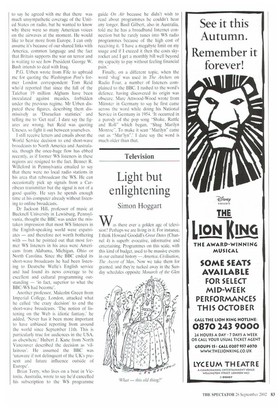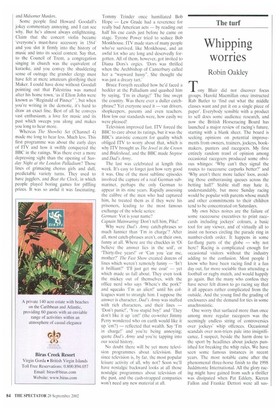Light but enlightening
Simon Hoggart
Was there ever a golden age of television'? Perhaps we are living in it. For instance, I think Howard Goodall's Great Dates (Channel 4) is superb: evocative, informative and entertaining. Programmes on this scale, with this kind of budget, used to be massive events in our cultural history — Ametica, Civilisation, The Ascent of Man. Now we take them for granted. and they're tucked away in the Sunday schedules opposite Monarch of the Glen
and Midsomer Murders.
Some people find Howard Goodall's jokey commentary annoying, and I can see why. But he's almost always enlightening. Claim that the concert violin became 'everyone's must-have accessory in 1564' and you slot it firmly into the history of music and into its social context. Say that, to the Council of Trent, a congregation singing in church was the equivalent of karaoke, and you convey the shuddering sense of outrage the grander clergy must have felt at mere amateurs glorifying their Maker. I could have done without Goodall pointing out that Palestrina was named after his home town, 'as if Elton John were known as "Reginald of Pinner" ', but when you're writing in the demotic, it's hard to draw an exact line. Best of all he conveys vast enthusiasm, a love for music and its past which sweeps you along and makes you long to hear more.
Whereas The Showbiz Set (Channel 4) made me long to hear less. Much less. This first programme was about the early days of ITV and how it swiftly conquered the BBC in the ratings. Was there ever a more depressing sight than the opening of Sunday Night at the London Palladium? Those lines of grimacing chorus girls and dull, predictable variety turns. They used to have jugglers, and Beat the Clock, in which people played boring games for piffling prizes. It was so awful it was fascinating.
Tommy Trinder once humiliated Bob Hope — Lew Grade had a reverence for really bad American acts — by reading out half his cue cards just before he came on stage. Tyrone Power tried to seduce Bob Monkhouse. ITV made stars of many people who've survived, like Monkhouse, and an awful lot who are long and deservedly forgotten. All of them, however, got invited to Diana Dors's orgies. 'Dors was thrilled when the Archbishop of Canterbury called her a "wayward hussy". She thought she was just a dreary tart.'
Bruce Forsyth recalled how he'd faced a heckler at the Palladium and quashed him by saying. 'I'm in charge!' The line swept the country. Was there ever a duller catchphrase? Yet everyone used it — van drivers, shopkeepers, parents and even teachers. How low our standards were, how easily we were pleased!
Television improved fast. ITV forced the BBC to care about its ratings, but it was the BBC's atavistic concern for quality which obliged ITV to worry about that, which is why ITV brought us The Jewel in the Crown and Bfideshead, and the BBC made Steptoe and Dad's Army.
The last was celebrated at length this week. It's easy to forget just how very good it was. One of the most sublime episodes involved the capture of a real German submariner, perhaps the only German to appear in its nine years. Rapidly assessing the calibre of the men who had captured him, he treated them as if they were his prisoners, leading to the most famous exchange of the whole series:
German: V ot is your name?
Captain Mainwaring: Don't tell him, Pike!
Why were Dad's Ann)' catch-phrases so much funnier than 'I'm in charge'? After all, most catch-phrases aren't, on their own, funny at all. Where are the chuckles in 'Oi believe the answer lies in the soil', or 'Thirty-five years!' or 'Can you 'ear me, mother?' The Fast Show created dozens of lines which weren't remotely funny — `In't it brilliant?' I'll just get me coat' — yet which made us fall about. They even took the mickey out of themselves, with the office nerd who says 'Where's the pork?' and squeaks 'I'm an alien!' until his colleagues want to strangle him. I suppose the answer is character. Dad's Army was stuffed with rich characters, and their lines — 'Don't panic!', You stupid boy!' and 'They don't like it up 'em!' (the co-writer Jimmy Perry wondered who on earth would like it up 'em?) — reflected that wealth. Say 'I'm in charge!' and you're being annoying; quote Dad's Army and you're tapping into our social history.
No doubt there will be yet more television programmes about television. But since television is, by far, the most popular leisure activity of all, why not? Soon we'll have nostalgic backward looks at all those nostalgic programmes about television of the past, and the cash-strapped companies won't need any new material at all.



































































































 Previous page
Previous page